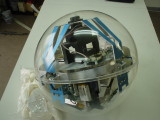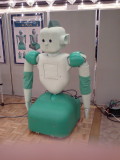Department of Computer Science and Systems Engineering
Realization of Intellectualized Novel Information Systems -Toward an Actualization of Creative Processes-
 Department of Computer and Systems Engineering is devoted to such themes as “pursuit of creative process through intelligence” and “creation of the next generation intellectualized information systems”. The department aims at one of the newest academic disciplines by integrating not only the fields of computer science and information technology, but also various scientific and engineering fields including electronics, mechanical engineering, life science, social science, and so on. The multi-disciplinary nature of computer science and systems engineering offers an exciting challenge for students thinking of embarking on a career in almost all scientific and engineering fields as well as information technology fields in advanced and more computerized society.
Department of Computer and Systems Engineering is devoted to such themes as “pursuit of creative process through intelligence” and “creation of the next generation intellectualized information systems”. The department aims at one of the newest academic disciplines by integrating not only the fields of computer science and information technology, but also various scientific and engineering fields including electronics, mechanical engineering, life science, social science, and so on. The multi-disciplinary nature of computer science and systems engineering offers an exciting challenge for students thinking of embarking on a career in almost all scientific and engineering fields as well as information technology fields in advanced and more computerized society.
In April 2010, the Department of Computer Science and Systems Engineering (MC/DC) from the Graduate School of Engineering, and started the Graduate School of System Informatics, which consists of the following three departments: Systems Science, Information Science, and Computational Science.
Structure and related departments in Graduate School of System Informatics
System Science
In the department, the student pursues basic theories and methodologies for analyzing, designing, constructing, and operating systems of increasing size and complexity. The student works with concepts and functions that are common to a variety of systems, theoretically, scientifically, and in practice, without specializing in a specific engineering field, such as mechanical, electrical, or information engineering. Additionally, the student integrates software engineering and hardware engineering, pursues real world and information world connections, and acquires an academic education and research experience related to a wide variety of theories and engineering, from system infrastructure to integration.
Information Systems
In the department, the student pursues the exploration and expansion of new academic fields of information science and technology that will contribute to an advanced information society. The Department of Information Science thus provides the student with an education and research experience not only specifically in computer programming, but also in the search for new methodologies related to the construction of basic mathematical information theories and information processing as well as advanced information application technology, with a focus on computers, networks, information systems that organically combine computers and networks, content media, and intelligence, resulting in a balanced education and research experience.
Computational Science
In the department, the student pursues the theories and methodologies related to the quest for science and technology based on a computational approach, and the theories and basic technologies of high-performance computation in support thereof. As a result, the program provides the student with an education and research experience in the technical foundation of ultra-high-speed, massively parallel systems; the basics of a computational approach, such as mathematical modeling, simulation, and visualization, and the application thereof; the understanding and clarification of natural events based on a computational approach; and the prediction of unknown phenomena and events, taking into consideration computational science industrial applications and societal contributions.
Message for international students
 The course structure aims at the wide and deep exploration of education and research relating to computer and systems engineering. The undergraduate program structure of the department is carefully designed for students to study multi-disciplinary major courses as well as liberal arts. Freshman students start fundamental courses of computer science and systems engineering, such as mathematics, physics, logic circuits, and computer engineering.
The course structure aims at the wide and deep exploration of education and research relating to computer and systems engineering. The undergraduate program structure of the department is carefully designed for students to study multi-disciplinary major courses as well as liberal arts. Freshman students start fundamental courses of computer science and systems engineering, such as mathematics, physics, logic circuits, and computer engineering.
Sophomore students study both the fundamental and advanced courses including programming languages, spectrum analysis, and system analysis. Further junior students mainly take advanced such as database systems, sensing technology, and robotics. All senior students are engaged in research projects. Four-year Bachelor’s degrees are awarded to undergraduate students.
